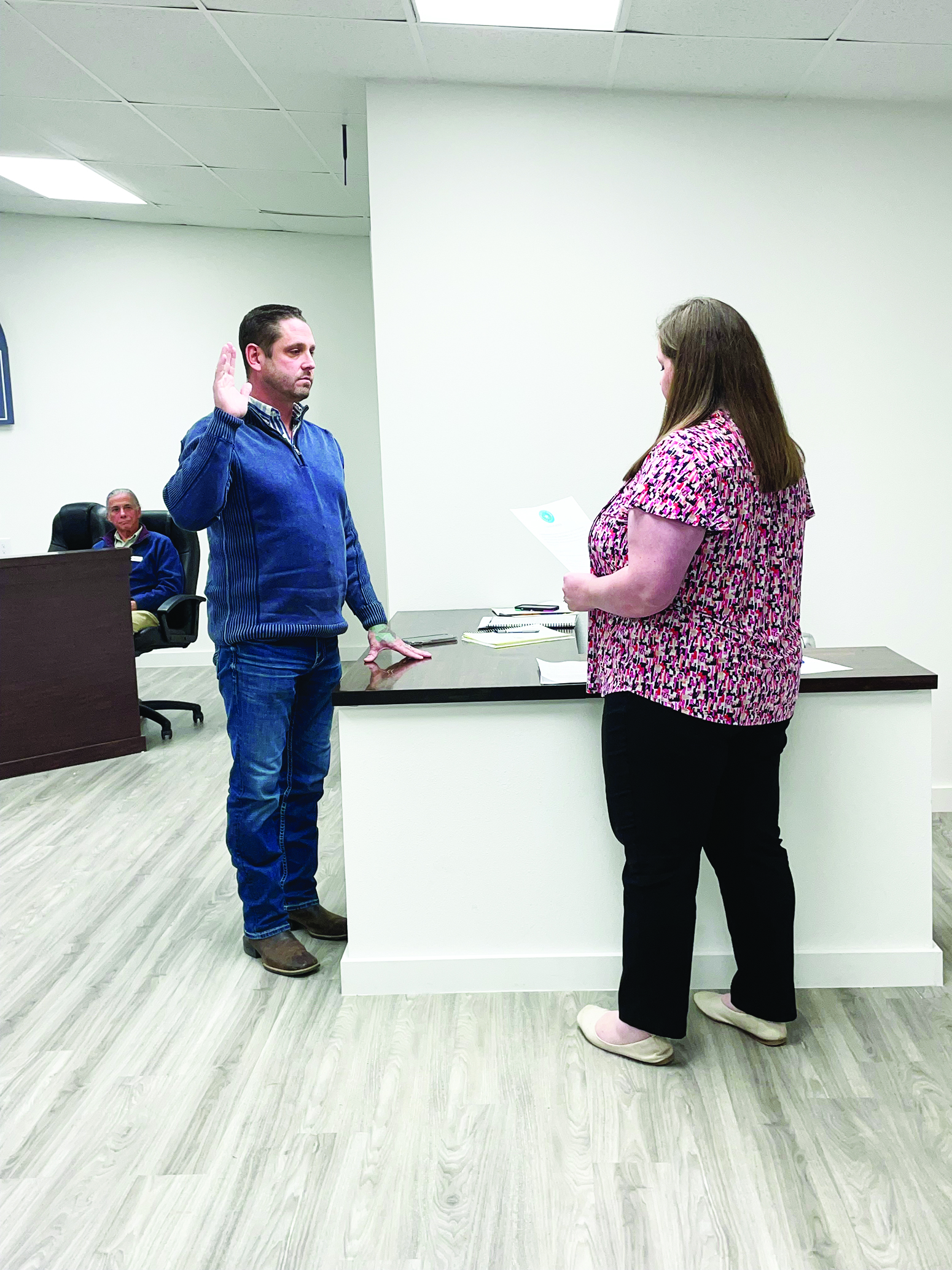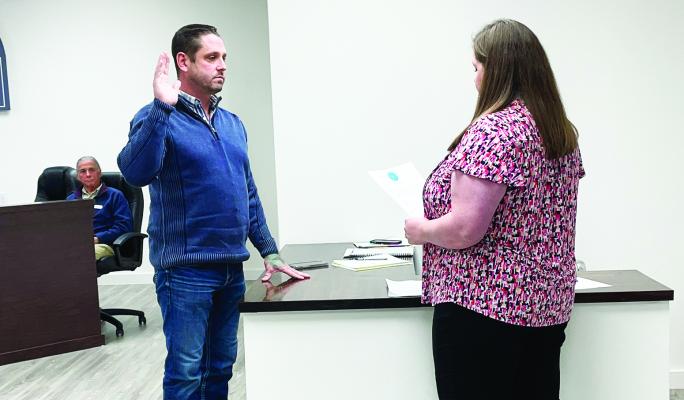Tool City Council discusses emergency fund

Monitor Photo/Di Johnson
Daniel Sayre (left) becomes the newest member of the Tool City Council Dec. 18, 2023 after a month of vacancy in the seat. Sayre is among four who applied for the seat, and after publicly interviewing each candidate, the council voted to have Sayre join them. Sayre is the POA president of the Paradise Bay subdivision and plans to use his organizational expertise from this position and his time in the military to improve the city during his one-year term. Swearing Sayre in is City Secretary Kimberley Price.
TOOL–Tool City Administrator Julius Kizzee brought before the council plans to create a minimum balance for the city’s emergency fund Dec. 21, 2023.Council members conducted a first reading and discussion of a proposed ordinance to this end.
“It’s an ordinance that I think would outline kind of where this council and future councils would see the emergency fund kind of have some economic stability,” said Kizzee. “This calls for four months of operating budget expenses to be saved up for that balance for the fiscal year. The maximum shall be six months. If the balance falls below the minimum required level, the city has a maximum of five years to replenish the funds at the required minimum level.
Kizzee went on to say that if the balance including interest exceeds six months of operating expenses in that account, the excess will be transferred to the Capital Reserve Account at the end of the fiscal accounting period. Currently, the City of Tool emergency fund as of this printing has $519,998.15, which Kizzee says is subject to change.
Councilmember Vera Bennett suggested tabling the item until the funds are allocated, then determining what the council will do with the emergency fund.
Councilmember Greg Figueroa, who attended the council meeting via video streaming, stated, “I think on this issue, in order to allocate the funds, we need to decide how much we are going to leave in the emergency fund, because after that, there really isn’t any other money to decide where it goes other than the capital reserve fund... My suggestion is that the emergency fund is triggered by 10% of our annual budget.”
Figueroa said that the emergency fund has always been a savings account for the city. In determining what to have as a minimum balance of a true emergency account, Figueroa says that he cannot think of a time that the city has experienced an emergency that has cost the city more out of pocket than the 10% he suggested, given the city’s budget of $2.7 million and the insurance held by the city. He went on to say that if the city places too much money in the emergency fund, less can be used for capital improvements such as roads and new development expenses, keeping the city from growing as the rate desired. He stated that before allocating the money, the city needs to determine the minimum balance of the emergency fund so that city leaders have a clear view of the actual excess amount.
Bennett stated that though she was aware that the emergency fund had been used as a savings account thus far, she does not believe that to be the best way to handle the city’s finances. She suggested putting a portion of the excess funds into the capital improvement fund to help fund expenses that have been made from the emergency account in the past, such as police vehicles.
Bennett went on to say that if a catastrophic event occured and the city needed to front money for relief before the insurance could pay the city, the designated emergency fund with a sizeable balance was needed. Bennett stated that if the city continues to spend down the emergency fund balance rather than capital improvement or reserve funds for nonemergency expenses, the funds would not be there if disaster struck.
“To say you only have two-hundred-and-something-thousand-dollars for an emergency fund is just not adequate,” Bennett said, going on to say that she did agree with Figueroa that all of the city’s money did not need to be in the emergency fund but that the council needed to determine an amount at the following meeting that could be agreed upon. The emergency fund would be bolstered to this amount over time, and once the balance is sufficient, all excess funds would go to capital improvement or capital reserve.
Figueroa stated that he agreed with Bennett’s sentiment, however, he feels the city would be best off using a percentage of the annual budget, as overhead expenses change from year to year. He suggested 10% or 15% of the total budget amount.
Bennett rebutted with a proposal of $450,000 as the minimum balance for the fund, beginning with a balance of $319,000 and built up to the minimum balance over a period of five years, adding $50,000 the first year.
Council members ultimately agreed upon a beginning balance of $375,000 in the fund with the balance to be built up to $500,000 over time. Kizzee stated that there will be a resolution for excess fund allocation, as well as an amended ordinance for the council’s decision on minimum and maximum balances in the emergency fund, at the January meeting.
In other business, council members:
• Did not pass a variance request to allow a drive-through restaurant, Elevation Coffee & Bakery, to be opened with the placement of a portable building.
• Approved entering an interlocal agreement with the Local Government Purchasing Cooperative.
• Approved entering an Interlocal Agreement with Henderson County for the purposes of city-county plat approval.
• Approved adding three authorized bank signers to the Eight at Tool Park account.




